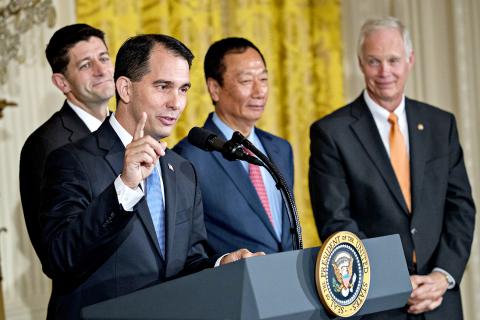Hon Hai Precision Industry Co (鴻海精密), known as Foxconn Technology Group (富士康) outside of Taiwan, on Wednesday announced plans to build a US$10 billion LCD panel plant in Wisconsin, a deal US President Donald Trump said would not have happened without his efforts.
The company said it plans to invest US$10 billion over four years to build a 1.86 million square meter plant that could employ up to 13,000 people.
Trump praised Hon Hai chairman Terry Gou (郭台銘) at a White House event, saying: “If I didn’t get elected, he definitely wouldn’t be spending US$10 billion... This is a great day for America.”

Photo: Bloomberg
Wisconsin Governor Scott Walker said that his state would award US$3 billion in incentives, and was to sign a memorandum of understanding on the investment yesterday.
The state legislature would need to approve the package, he said, adding that about half is for capital costs and nearly half for workforce development. There are also some sales tax exemptions.
The decision “signifies the start of a series of investments by Foxconn in American manufacturing in the coming years,” Hon Hai said in a statement.
The tax incentives would be awarded over 20 years if Hon Hai meets hiring targets, officials said.
The plant would be the largest economic development project in the state’s history, Walker said.
White House Chief of Staff Reince Priebus told a Wisconsin television station that Trump spotted the site of a former Chrysler plant when aboard Marine One over Kenosha, Wisconsin, in April.
When Hon Hai executives met with Trump in the Oval Office, Priebus said: “The president said I know a good spot where you should go — that place in Kenosha.”
Walker said Hon Hai is considering several sites in southeast Wisconsin and is to announce a final site soon.
Wisconsin state Senator Jennifer Shilling questioned whether there is “legislative appetite for a US$1 [billion] to US$3 billion corporate welfare package... The bottom line is this company has a concerning track record of big announcements with little follow-through.”
Meanwhile, Vice Minister of Economic Affairs Yang Wei-fu (楊偉甫) said that the government looks favorably on Hon Hai’s decision to invest in the US, as it demonstrates the business strategy of a multinational corporation like Hon Hai to conduct an effective, global flat-panel operation.
The government hopes that the investment could be a win-win situation for Taiwan and the US in terms of technology and other forms of cooperation, Yang said, adding that the government also hopes the company would consider investing in Taiwan.
The investment would have a limited short-term effect on the development of the local flat-panel industry, given a well-developed domestic supply chain, and resilience and diversification among local manufacturers, the ministry said in a statement.

MAKING WAVES: China’s maritime militia could become a nontraditional threat in war, clogging up shipping lanes to prevent US or Japanese intervention, a report said About 1,900 Chinese ships flying flags of convenience and fishing vessels that participated in China’s military exercises around Taiwan last month and in January last year have been listed for monitoring, Coast Guard Administration (CGA) Deputy Director-General Hsieh Ching-chin (謝慶欽) said yesterday. Following amendments to the Commercial Port Act (商港法) and the Law of Ships (船舶法) last month, the CGA can designate possible berthing areas or deny ports of call for vessels suspected of loitering around areas where undersea cables can be accessed, Oceans Affairs Council Minister Kuan Bi-ling (管碧玲) said. The list of suspected ships, originally 300, had risen to about

DAREDEVIL: Honnold said it had always been a dream of his to climb Taipei 101, while a Netflix producer said the skyscraper was ‘a real icon of this country’ US climber Alex Honnold yesterday took on Taiwan’s tallest building, becoming the first person to scale Taipei 101 without a rope, harness or safety net. Hundreds of spectators gathered at the base of the 101-story skyscraper to watch Honnold, 40, embark on his daredevil feat, which was also broadcast live on Netflix. Dressed in a red T-shirt and yellow custom-made climbing shoes, Honnold swiftly moved up the southeast face of the glass and steel building. At one point, he stepped onto a platform midway up to wave down at fans and onlookers who were taking photos. People watching from inside

Japan’s strategic alliance with the US would collapse if Tokyo were to turn away from a conflict in Taiwan, Japanese Prime Minister Sanae Takaichi said yesterday, but distanced herself from previous comments that suggested a possible military response in such an event. Takaichi expressed her latest views on a nationally broadcast TV program late on Monday, where an opposition party leader criticized her for igniting tensions with China with the earlier remarks. Ties between Japan and China have sunk to the worst level in years after Takaichi said in November that a hypothetical Chinese attack on Taiwan could bring about a Japanese

STREAMLINED: The dedicated funding would allow the US to transfer equipment to Taiwan when needed and order upgraded replacements for stockpiles, a source said The US House of Representatives on Thursday passed a defense appropriations bill totaling US$838.7 billion, of which US$1 billion is to be allocated to reinforcing security cooperation with Taiwan and US$150 million to replace defense articles provided to the nation. These are part of the Consolidated Appropriation Act, which the US House yesterday passed with 341 votes in favor and 88 against. The act must be passed by the US Senate before Friday next week to avoid another government shutdown. The US House Committee on Appropriations on Monday unveiled the act, saying that it allocates US$1 billion for the Taiwan Security Cooperation Initiative